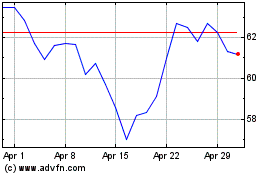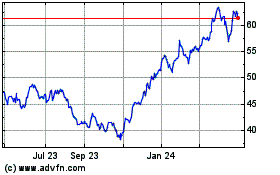Cameron, Pro-Brexit Campaigners Spar Over Turkey
May 22 2016 - 10:00PM
Dow Jones News
LONDON—The debate over Turkey's place in Europe on Sunday became
the latest battle line to be drawn between British Prime Minister
David Cameron and campaigners pushing for the U.K. to leave the
European Union.
Mr. Cameron responded to claims by Vote Leave, the main group
campaigning for the U.K. to leave the EU, that Turkey would soon be
allowed to join the EU, giving millions of citizens from the
Muslim-majority nation the right to live and work in Britain.
The spat comes weeks before Britons go to the polls, to vote in
a referendum on whether to stay or leave the 28-nation bloc.
Advocates on both side of the debate are zeroing in on their
strongest arguments, with Leave campaigners highlighting the risks
of immigration in the face of warnings by the government-backed
Remain camp that the economy will be seriously damaged if the U.K.
pulls out of the EU.
On Sunday, Mr. Cameron locked horns with Penny Mordaunt, a
pro-Leave proponent who is also a minister in Mr. Cameron's
government. The two Conservative politicians gave sharply
contrasting accounts of how Britain intends to use its veto over
Turkey's possible ascension to the EU.
Ms. Mordaunt said in an interview with the British Broadcasting
Corp.'s Andrew Marr that Britain wouldn't be able to stop Turkey
joining the EU.
"I do not think that the EU is going to keep Turkey out. I think
it is going to join. I think the migrant crisis is pushing it more
that way," said Ms. Mordaunt.
Shortly afterward, Mr. Cameron dismissed Ms. Mordaunt's claims
in an interview with ITV's Robert Peston.
"On this question of whether or not we have a veto, the Leave
campaign are wrong," said Mr. Cameron, "It is not remotely on the
cards that Turkey is going to join the EU any time soon. They
applied in 1987. At the current rate of progress, they will
probably get round to joining in about the year 3000."
With the June 23 referendum only weeks away, Leave and Remain
campaigners are hewing to the two issues that will likely decide
the vote: immigration and the economy.
Mr. Cameron opened a fresh salvo on this front, too, warning
that British households will face higher prices in the event that
his compatriots vote to leave next month.
Analysis by the U.K. Treasury suggests post-Brexit uncertainty
could precipitate a 10% fall in the value of sterling, driving up
the price of imports, Mr. Cameron's office said on Sunday. In turn,
this would lead to a family of four paying £ 220 ($319) extra after
two years, said Downing Street.
"This isn't about dry economics; this is about the economic
security of hardworking families in Britain," said Mr. Cameron in a
statement. "Families are better off voting to remain in the EU—the
alternative is a leap in the dark that would risk prosperity and
security."
Vote Leave were quick to disagree.
"Sterling will not fall if we vote Leave, so claims of prices
rises are wrong," said Vote Leave spokesman Robert Oxley in an
emailed statement.
Write to Alexis Flynn at alexis.flynn@wsj.com
(END) Dow Jones Newswires
May 22, 2016 21:45 ET (01:45 GMT)
Copyright (c) 2016 Dow Jones & Company, Inc.
Citigroup (NYSE:C)
Historical Stock Chart
From Mar 2024 to Apr 2024

Citigroup (NYSE:C)
Historical Stock Chart
From Apr 2023 to Apr 2024
